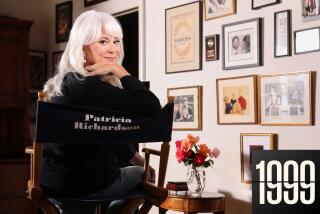‘Prairie’ sleeps under the stars
- Share via
The end looms large in Robert Altman’s “A Prairie Home Companion,” which nevertheless takes its sweet time saying goodbye. Written by Garrison Keillor, creator and host of the long-running public radio show, the movie is a pretty curious artifact -- a retraction of a send-up, in which Keillor’s mild, pleased-with-itself spoof of old-time radio variety shows is recast as an actual old-time radio variety show. The audience filling the Fitzgerald theater in St. Paul in the movie doesn’t appear that different from the ones who might fill it in real life or who tune in from the coasts. But the performers on stage -- including a hangdog emcee known as G.K. (Keillor) -- don’t exactly look like NPR coffee-mug types. Most of them are shucksy and woebegone for real.
Altman has made a long, varied career of peeking under the rug of various subcultures to reveal the underside of the weave. On the face of it, making a movie about “A Prairie Home Companion,” a show that has run for 32 years, would seem to make sense. But far from taking a “Larry Sanders Show”-style approach, Keillor’s script wants to be “interesting” more than it wants to be honest. Rather than focus on internecine rivalries, disconnects between the characters and the people who play them, etc., Keillor creates an alternative universe that resembles the fictional universe of his show. It’s as if Restoration Hardware’s marketing department woke up one day suddenly believing its own copy.
The result is at once familiar and disconcerting, meta-Keillor done in Altman’s desultory, distracted style. The formidable cast of characters fluttering around the imperturbable host includes Meryl Streep and Lily Tomlin as sisters Yolanda (Streep) and Rhonda (Tomlin) Johnson, the last remaining members of a musical family whom Yolanda describes to her daughter Lola (Lindsay Lohan) as “the Carter family, only not famous”; a hard-boiled private detective Guy Noir (Kevin Kline) of the public radio show’s occasional pulp fiction parody; Maya Rudolph as a put-upon assistant; and Woody Harrelson and John C. Reilly as a duo of singing cowboys -- characters who don’t belong on the same plane of existence, let alone in the same movie.
The gumshoe business not being what it used to be, Guy has taken a job doing security for the show. The movie takes place almost entirely within the confines of the theater on the night of the 30-year-old show’s final broadcast, as the radio station has been bought by a Texas conglomerate run by Bible-thumping vulgarians -- they’ve never even heard of F. Scott Fitzgerald -- who plan to shut down the operation. While he’s expecting “the Axeman” (Tommy Lee Jones) to make an appearance, Guy doesn’t know what to make of the apparition in a white trench coat who shows up unannounced.
Of course, no one expects the angel of death, especially not when she looks like Virginia Madsen. But that’s what she is -- the celestial continuation of a longtime “Prairie Home” listener who laughed at a joke, lost control of her car and died, come to escort an elderly cast member to the Lord.
Altman uses his trademark wandering camera to mosey from character to character, pausing to watch and listen as they tease one another, reminisce about the old days, worry about the future and fart inappropriately. As Rhonda and Yolanda, Tomlin and Streep twitter and cluck and talk over each other, filling Lola in on their life and times. Lola, a poetry-writing smarty whose subject is suicide, listens patiently to stories about Wanda, whose Christian fans turned on her after she was arrested for shoplifting. She suffered an episode of hypoglycemia and forgot to pay for a doughnut. “If she were in a rock band,” instead of a Christian group, “she could have thrown sofas out the window,” Yolanda says. “But they’d just as soon kill you as look at you, some of those ‘good people.’ ”
Given their status as living anachronisms, it’s natural that “A Prairie Home’s” fictional characters would feel threatened with extinction. But the fear seems to come from an unusual source. Of all popular entertainment programs, surely “A Prairie Home Companion” has the least to fear from the nipple-censoring fundies, even if it is a bastion of Minnesotan liberalism. What’s harder to figure is why the modern world Keillor and Altman have created -- with its censoring Christians, philistine corporations and hysterical regulatory agencies -- feels so old-fashioned and off the mark.
If the real-life show on which the movie is based has managed to survive for 32 years, it likely has more to do with ratings than with its station’s drive for cultural preservation. But the “Prairie Home Companion” of the movie is hardly the middlebrow juggernaut known to listeners. Instead it’s been converted to kitsch museum, which might as well house a giant ball of string. The improvised patter is funny and sharp, the music kicky and the nods to fake sponsors familiar, but without Keillor’s monologue and the show’s collective inclusion on the joke, the movie falls into a strange nostalgia for something that hardly anyone remembers, if it ever really existed at all. Anyone who does remember is likely to be put off by the not-so-gentle ribbing of the opening credits. Over a picture of a country scene at dusk, an invisible hand fiddles with the radio dial, pausing to listen to farm reports, bellowing ministers, a country lady reciting a recipe that calls for cream of mushroom soup and egg noodles instead of the eye-talian ones. It’s a little joke on the prairie, but who’s laughing at whom?
*
‘A Prairie Home Companion’
MPAA rating: PG-13 for risque humor
A Picturehouse release. Director Robert Altman. Screenplay Garrison Keillor. Story by Keillor and Ken LaZebnick. Producers David Levy, Tony Judge, Joshua Astrachan, Wren Arthur, Robert Altman. Director of photography Ed Lachman. Editor Jacob Craycroft. Music by Richard Dworsky. Running time: 1 hour, 45 minutes.
In selected theaters.
More to Read
Only good movies
Get the Indie Focus newsletter, Mark Olsen's weekly guide to the world of cinema.
You may occasionally receive promotional content from the Los Angeles Times.










